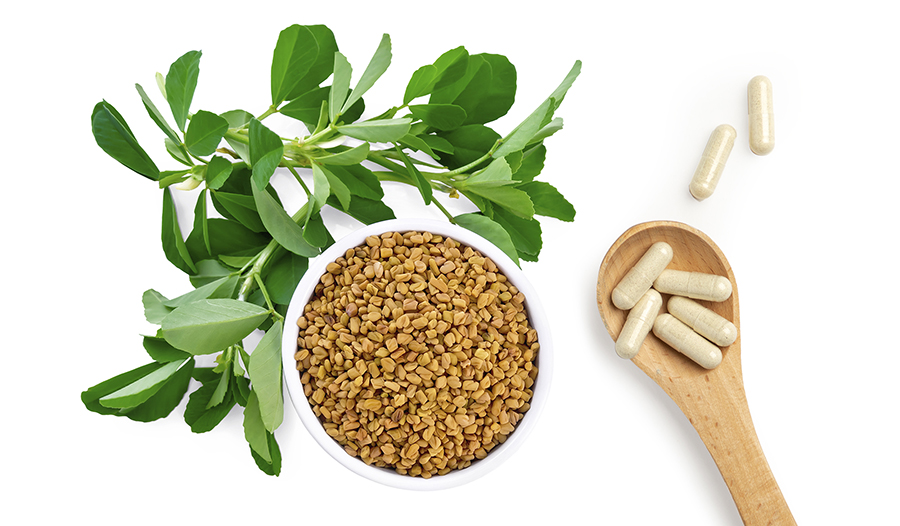What Is Fenugreek? Here Are Its 7 Potential Health Benefits

Traditionally used in Chinese and Ayurvedic medicine, fenugreek (Trigonella foenum-graecum) is an herb with thousands of years of documented health benefits. Also used to flavor many dishes in Indian cuisine, fenugreek is used as a cooking spice, giving food a nutty flavor profile while adding nutritional value with healthy vitamins and minerals.
Just one tablespoon of fenugreek seeds provides three grams of fiber, three grams of protein, and 20 percent of iron’s daily recommended value. Often found in powder or seed form, fenugreek can be easily added to your daily dietary routine.
What Are the Health Benefits of Fenugreek?
Fenugreek has many indications for supporting better health in both human and animal studies. Lowering blood sugar and cholesterol, improving metabolism, and aiding in digestion and labor induction are just a few of the health benefits fenugreek may have.
1. Fenugreek May Lower Blood Sugar
One study found that the addition of 15 grams of powdered fenugreek seed soaked in water significantly lowered glucose levels of non-insulin-dependent diabetics (NIDDM) after eating. Insulin levels decreased after the study participants consumed fenugreek powder.
Fenugreek has also helped to support more balanced fasting blood sugar levels in diabetics. An additional study found that type 1 diabetics who took 50 grams of fenugreek seed powder for ten days twice a day at lunch and dinner had lower total and LDL cholesterol levels with improved blood sugar levels.
2. Fenugreek May Lower Cholesterol
There is evidence that fenugreek may lower cholesterol levels. Doses of 2.5 grams given twice a day for three months significantly decreased total cholesterol and triglycerides for patients with both NIDDM and coronary artery disease (CAD). The same dose significantly lowered both postprandial and fasting blood glucose levels.
Another study found Type-1 Diabetics that took 50 grams of fenugreek powder twice a day for ten days had lower LDL (bad) cholesterol levels and lower total cholesterol.
3. Fenugreek May Improve Digestive Health
Fenugreek studies have revealed that this ancient herb may have antiulcer properties. Those with ethanol-induced gastric ulcers got treated with a fenugreek supplement. The gel extract made from fenugreek seeds showed significant ulcer protective effects.
These protective properties got attributed to fenugreek’s anti-secretory action plus the rise in the antioxidant potential of the stomach lining which lowered injury to the mucus membrane. This study also determined that the fenugreek seed gel was more effective than omeprazole, a pharmaceutical medication, at preventing the formation of stomach lesions.
Fenugreek has also helped to ease the discomfort of heartburn. A pilot study found that participants with frequent heartburn who took fenugreek for two weeks had minimized heartburn symptoms. The study also found fenugreek to be just as effective as over-the-counter antacid medications.
Appetite suppression has been another surprising benefit that may be associated with fenugreek. Reduction in appetite and fat intake have both gotten observed with fenugreek clinical studies.
Due to its high fiber content of three grams of soluble fiber per tablespoon, fenugreek can help alleviate bloating and constipation. Its demulcent properties also help ease digestive system discomfort by forming a protective film over the gastrointestinal membranes, helping to relieve irritation.
4. Fenugreek May Help Relieve Painful Periods
Ancient Egyptians used fenugreek to help with painful periods or dysmenorrhea. Present-day studies show that women given 900 milligrams (mg) of fenugreek seed powder three times a day on the first three days of their menstrual cycle for two consecutive months experienced less extreme pain severity and duration of pain. Other symptoms that responded to the fenugreek treatment include nausea, headache, fatigue, and vomiting with no reported adverse side effects.
5. Fenugreek May Improve Male and Female Libido
Both men and women have reported an uptick in sexual desire and arousal with fenugreek supplementation.
A six-week study that provided 600 mg of fenugreek to 30 men found that most participants reported a more healthy sexual function, stamina, sexual arousal, and strength. Women who took the same dose of fenugreek extract showed a significant boost in free testosterone and estradiol levels after eight weeks of supplementation—the cause of their renewed sexual desire and arousal.
Further research shows that fenugreek may help support testosterone levels in men as well. One eight-week study gave 500 mg of fenugreek to 30 college-aged men each day. The men performed weightlifting sessions four times per week. While the group who did not take fenugreek saw a slight drop in testosterone levels, the group who took fenugreek had a boost in testosterone levels and a reduction in body fat percentage. Testosterone also has positive effects on the male libido.
6. Fenugreek May Support Breast Milk Production
For mothers who struggle to make sufficient breast milk to feed their baby, fenugreek could be a potential natural alternative to prescription drugs used to maintain breast milk production.
A group of 66 mothers got split into three groups. One group received fenugreek tea, another placebo, and the last received nothing (control group). The study found both the placebo and the control group increased the volume of pumped breast milk by 34 milliliters (ml) (1.5 ounces (oz)). The fenugreek tea group increased their pumped milk volume by 73 ml (2.47 oz).
In a separate study, 77 mothers were to drink fenugreek seed tea for 14 days. The mothers found the tea increased their breast milk production and allowed their babies to gain more weight.
7. Fenugreek May Help with Skin Inflammation
Many cultures have used fenugreek as a topical poultice to help soothe irritated and inflamed skin. Traditionally, fenugreek has treated inflammatory skin conditions such as eczema, ulcers, and furunculosis, or infection of the hair follicle leading to abscess formation.
Recent studies show fenugreek seed extract significantly decreased pain and inflammation for rats with paw edema or swelling. The anti-inflammatory and analgesic (pain-relieving) effects may be attributed to fenugreek’s mucilage polysaccharides and steroidal saponins.
How to Use Fenugreek
While fenugreek supplements typically get found in powder or seed form, you can consume this nutritional herb in many other ways.
You can use fenugreek in the following ways:
- Oral Supplement Capsules – This method may be ideal if you are looking for the most convenient way to experience the blood sugar and cholesterol-lowering effects of fenugreek.
- Herbal Tea – Drinking fenugreek herbal tea may be best for breastfeeding mothers considering the studies that have been done on breastmilk volume increase have used a tea. However, supplements may have a similar effect as tea. To make the tea, simply stir a spoonful of fenugreek powder into warm water and drink. You could also boil the seeds with other anti-inflammatory herbs such as turmeric, cinnamon, and ginger. Boil for 10 minutes and allow to cool before drinking.
- Topical Poultice – Using the seeds to make a topical cream would be ideal for skin irritation and inflammation support.
- Herbal Bath – Using the seeds or powder in a warm bath could also benefit inflammatory skin conditions such as eczema.
- Seeds – Soaking fenugreek seeds in water overnight is a great way to prepare them naturally with no processing. Simply take a spoonful of the soaked seeds in the morning for optimal digestive and blood sugar support.
- Sprouts – You can sprout fenugreek seeds by soaking them in water overnight, and then changing the water in the morning. Repeat this process for two to three days until green sprouts appear. Now they are ready to add to any vegetable or grain dish to enjoy. Try sprinkling the sprouts over a fresh salad or quinoa dish for added texture and flavor.
- Seasoning – Used as an herb for seasoning traditional Indian dishes, fenugreek can get added to various meals for nutritional benefit and a delicious nutty flavor. Often used in curries and sauces, fenugreek powder and seeds can get added to your favorite savory dish.
Fenugreek Risks and Side Effects
While considered generally safe, you should be aware of some mild side effects and potential drug/herb interactions.
Indigestion and diarrhea have been reported with the use of fenugreek. More serious side effects have gotten reported with animal studies. When fenugreek gets taken at very high doses, animal studies show adverse effects, including decreased fertility, increased risk of miscarriage, DNA damage, and neurological problems. The dosages used in these animal studies were much higher than any recommended dose for human consumption.
If you are a diabetic taking blood sugar lowering medication, you should use caution when taking fenugreek as it also displays blood sugar-lowering properties.
You may want to avoid fenugreek if you have an eating disorder or a decreased desire to eat, as it has suppressed appetite with resulting decreased fat intake.
Always ask your doctor before taking fenugreek or any new herb or supplement.
Fenugreek, The Big Picture
With a long history of use as a medicinal and flavoring herb, fenugreek is known for its health benefits across many cultures. From its use for flavor in Indian curries to its breastmilk production benefits via herbal tea, fenugreek is packed full of nutrition and has an enjoyable, sweet yet savory nutty.
No matter your plight, fenugreek is packed full of nutrients, including fiber, protein, iron, magnesium, and vitamin B6, offering a nutrient-dense tasty treat for all to enjoy.
References:
- Basch E, Ulbricht C, Kuo G, Szapary P, Smith M. Therapeutic applications of fenugreek. Altern Med Rev. 2003;8(1):20-27.
- Madar Z, Abel R, Samish S, Arad J. Glucose-lowering effect of fenugreek in non-insulin dependent diabetics. Eur J Clin Nutr. 1988;42(1):51-54.
- Neelakantan N, Narayanan M, de Souza RJ, van Dam RM. Effect of fenugreek (Trigonella foenum-graecum L.) intake on glycemia: a meta-analysis of clinical trials. Nutr J. 2014;13:7. Published 2014 Jan 18. doi:10.1186/1475-2891-13-7
- Sharma RD, Raghuram TC, Rao NS. Effect of fenugreek seeds on blood glucose and serum lipids in type I diabetes. Eur J Clin Nutr. 1990;44(4):301-306.
- Bordia A, Verma SK, Srivastava KC. Effect of ginger (Zingiber officinale Rosc.) and fenugreek (Trigonella foenumgraecum L.) on blood lipids, blood sugar and platelet aggregation in patients with coronary artery disease. Prostaglandins Leukot Essent Fatty Acids. 1997;56(5):379-384. doi:10.1016/s0952-3278(97)90587-1
- Pandian RS, Anuradha CV, Viswanathan P. Gastroprotective effect of fenugreek seeds (Trigonella foenum graecum) on experimental gastric ulcer in rats. J Ethnopharmacol. 2002;81(3):393-397. doi:10.1016/s0378-8741(02)00117-4
- DiSilvestro RA, Verbruggen MA, Offutt EJ. Anti-heartburn effects of a fenugreek fiber product. Phytother Res. 2011;25(1):88-91. doi:10.1002/ptr.3229
- Mathern JR, Raatz SK, Thomas W, Slavin JL. Effect of fenugreek fiber on satiety, blood glucose and insulin response and energy intake in obese subjects. Phytother Res. 2009;23(11):1543-1548. doi:10.1002/ptr.2795
- Chevassus H, Molinier N, Costa F, Galtier F, Renard E, Petit P. A fenugreek seed extract selectively reduces spontaneous fat consumption in healthy volunteers. Eur J Clin Pharmacol. 2009;65(12):1175-1178. doi:10.1007/s00228-009-0733-5
- Younesy S, Amiraliakbari S, Esmaeili S, Alavimajd H, Nouraei S. Effects of fenugreek seed on the severity and systemic symptoms of dysmenorrhea. J Reprod Infertil. 2014;15(1):41-48.
- Steels E, Rao A, Vitetta L. Physiological aspects of male libido enhanced by standardized Trigonella foenum-graecum extract and mineral formulation. Phytother Res. 2011;25(9):1294-1300. doi:10.1002/ptr.3360
- Turkyılmaz C, Onal E, Hirfanoglu IM, et al. The effect of galactagogue herbal tea on breast milk production and short-term catch-up of birth weight in the first week of life. J Altern Complement Med. 2011;17(2):139-142. doi:10.1089/acm.2010.0090
- Vyas S, Agrawal RP, Solanki P, Trivedi P. Analgesic and anti-inflammatory activities of Trigonella foenum-graecum (seed) extract. Acta Pol Pharm. 2008;65(4):473-476.
- Dawid-Pać R. Medicinal plants used in treatment of inflammatory skin diseases. Postepy Dermatol Alergol. 2013;30(3):170-177. doi:10.5114/pdia.2013.35620
DISCLAIMER:This Wellness Hub does not intend to provide diagnosis...
















































































 Table of Contents
Table of Contents
















